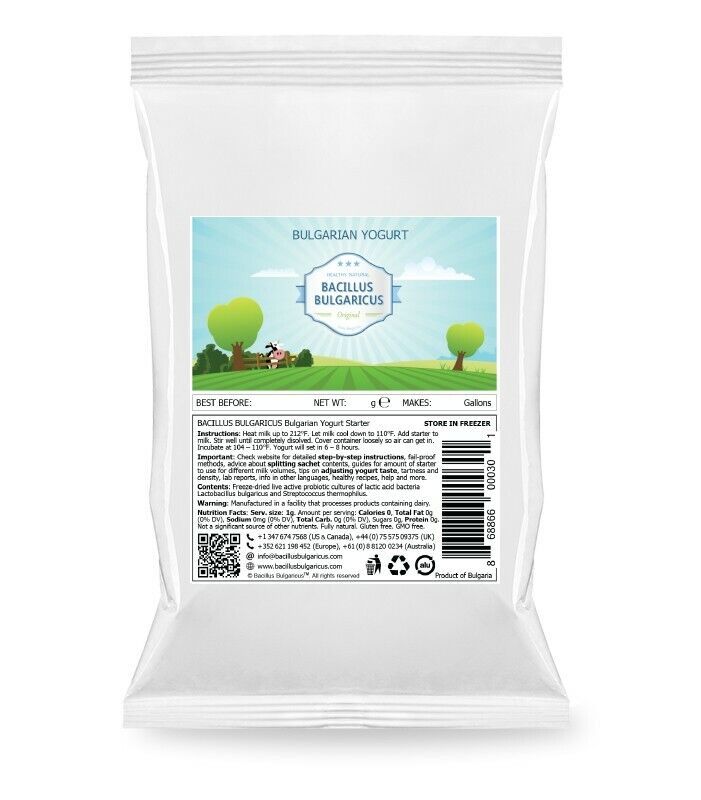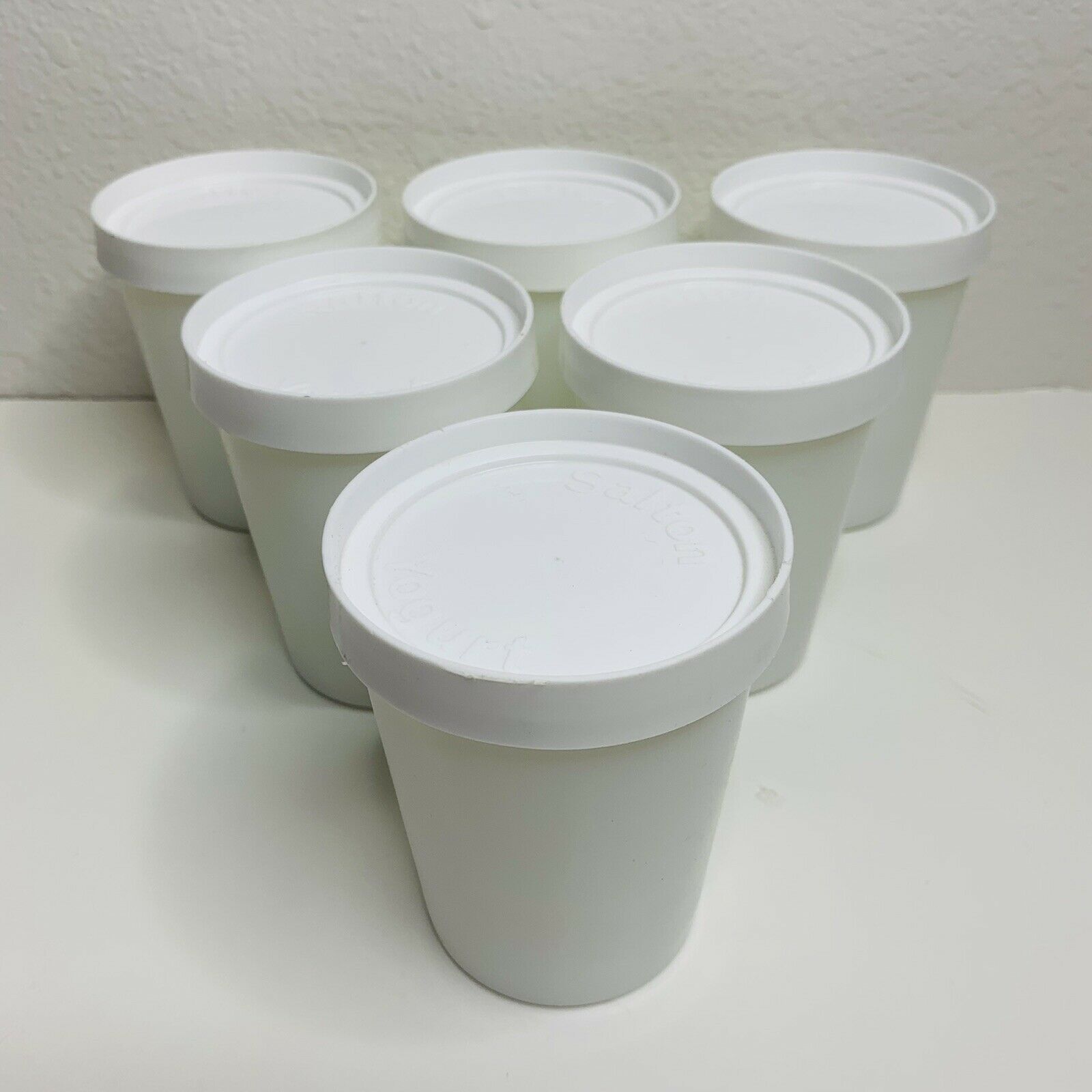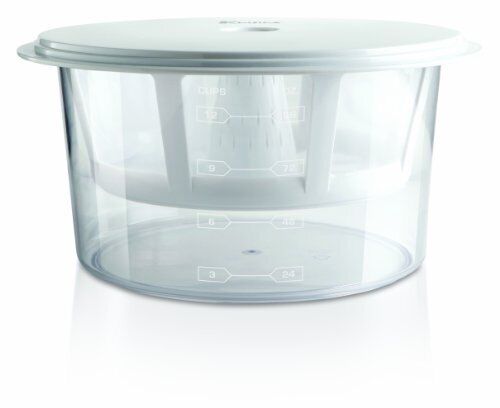-40%
Bacillus Bulgaricus yogurt starter,culture, probiotic(makes 8gal/32litres)
$ 9.18
- Description
- Size Guide
Description
Bulgarian yogurt is the most popular variety of yogurt in the world and is one of the things that make Bulgarians proud to call themselves Bulgarians; it is their exclusive invention and heritage that dates back many centuries.A mildly sour-tasting yogurt, kiselo mlyako is undoubtedly the best and the healthiest of all dairy products that are available to consumers nowadays. The western world calls it Bulgarian yogurt but in its homeland, Bulgaria, it?s called sour milk. Whatever the name, this wonderful probiotic food has impeccable ancestry ? it is believed to have been known for at least 4000 years.
Bulgarian yogurt comes under the general category of yogurts which contain live bacteria. For yogurt to be considered of the Bulgarian variety, it needs to be made with two specific starter bacteria, Lactobacillus delbrueckii subspecies bulgaricus (often simply called Lactobacillus bulgaricus) and Streptococcus salivarius subspecies thermophilus (often shortened to Streptococcus thermophilus). Most yogurts contain these two as they are such excellent starters but most ?ordinary? yogurt has other good bacteria added as well.
It is the particular combination of bacteria that characterizes the thickness, acidity, taste and aroma of the yogurt. Kiselo mlyako?s uniqueness lies in the peculiarities in the climate of the region and the very specific way in which it is prepared ? using a combination of the two strains: Lactobacillus Bulgaricus and Streptococcus Thermophilus. The Streptococcus Thermophilus bacteria goes into action first and prepares the perfect environment for Lactobacillus Bulgaricus, which in turn starts multiplying and slowly turns the milk into yogurt.
People who have tasted yogurt from countries all over the world always find that none of them tastes anything like the Bulgarian variety. Bulgarians completely agree that their yogurt is the best ? some 400 000 tons are consumed every year in the country.
It is super easy to make yogurt using our Bacillus Bulgaricus yogurt starter culture.
All you need is a pack of our starter and milk.
You can use any kind of milk you want ? cow?s, sheep?s, goat?s, skim, whole, raw, pasteurized, dairy or non-dairy, it always works!
The following 6 easy steps explain how to prepare your own yogurt without the help of an yogurt maker. If you have an yogurt maker, and would like to use that instead, then simply follow the instructions that came with it. If you are using your own containers, mason jars work best, however any type of container you are comfortable with will work just as well.
The instructions below are for 2 liters (1/2 gallon) of milk so you need to make more or less than that, adjust them accordingly.
Ingredients
1/2 gallon (2 liters) of milk
1/4 teaspoon of Bacillus Bulgaricus yogurt starter ? that?s a little heap of powder on the tip of a teaspoon
Preparation
Bring the milk to a gentle boil. The milk should boil in order to kill any existing bacteria in it, which could react with the Lactobacillus Bulgaricus. Milk boils at about 212°F / 100°C. Be careful not to burn it, otherwise your yogurt will inherit the burnt taste.
Cool the milk down to 110°F / 43°C. The easiest way to test for the right temperature is to dip your pinky finger in the milk ? if you can comfortably count to 5 then the milk is just right.
Move the milk to a separate processing container. You can use multiple smaller containers too.
Add 1/4 teaspoon of the starter. Mix well. This is important! Stir for a good 3-4 minutes (do not use a mixer, stir by hand). If you used more than one container, distribute the pack?s contents evenly in respect to their volumes.
Cover the container loosely with a lid. Do not close it air-tight.
Wrap the container well in blankets or cover with a tea cozy and let it sleep. Keep out of any draft.
The fresh yogurt will set in about 5-6 hours. If the place is cold the process may take longer (10-12 hours). You can easily check if the yogurt has set by tipping the container a bit ? its contents will be firm instead of liquid. For a denser yogurt with more acidic and tart taste you can leave it culturing longer (e.g. overnight).
Your yogurt is now ready to be enjoyed!
Smell it ? doesn?t it smell incredible! It tastes incredible as well!
A quick advice ? for best results, move it to the fridge for a couple of hours before you eat it ? it will get a bit denser and somehow yummier!
Important:
Keep the remaining yogurt starter in a Ziploc bag in the freezer. The starter is highly hydrophilic ? if moisture gets inside the pack it will ruin it quickly.










